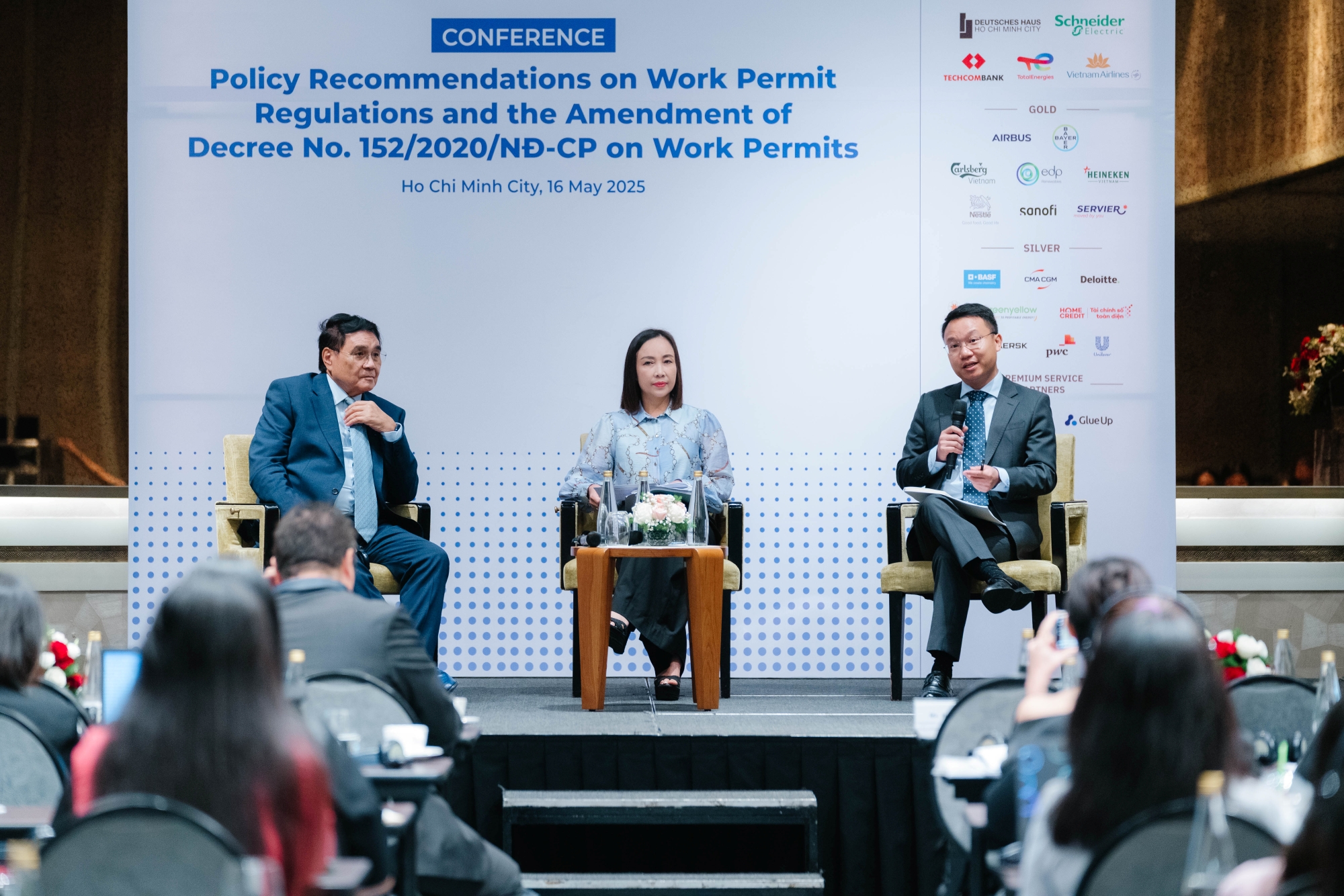
Forvis Mazars leader engaged in making business recommendations for the revision of Decree 152
Mr. Minh Nguyen (4th from the left) and representatives from the government along with experts at the event
In a significant move toward improving Vietnam’s regulatory environment for foreign professionals, the business community submitted a formal letter to the Ministry of Home Affairs (MOHA), offering key recommendations on the draft decree intended to replace Decree 152/2020/NĐ-CP. This decree currently governs work permits for foreign workers in Vietnam.
The submission was made during the high-level conference titled “Policy Recommendations on Work Permit Regulations and the Amendment of Decree No. 152/2020/NĐ-CP.” The session welcomed high-level government participation, including Mrs. Nguyen Thi Quyen, Deputy Director General of the Department of Employment (MOHA); Mr. Pham Anh Thang, Deputy Chief of Office of MOHA and Head of the Southern Representative Office; and Mrs. Nguyen Nu Thanh Nhan, Senior Official at the Ministry of Justice (MOJ), policy experts, and business leaders. The draft decree was submitted to the Government on 31 May 2025.
From left to right. Mr. Jean-Jacques Bouflet, Mrs. Nguyen Thi Quyen, and Mr. Minh Nguyen chairing the Q&A discussion
Experience vs. Degree: A Critical Barrier to Global Talent
The core of submission is a widely shared concern amongst the international business community: the rigid requirement for formal academic degrees when applying for expert work permits, even in fast-evolving sectors where such majors did not historically exist.
Businesses – particularly in semiconductors, artificial intelligence (AI), and digital transformation – have called for greater flexibility in recognizing professional experience in lieu of academic credentials.
EuroCham Chairman, Mr. Bruno Jaspaert highlighted the issue, stating: “It took more than six months of paperwork and waiting to bring in a logistics expert with 25 years of experience – just because he had a degree in biology. That is not just a cost burden; it slows down innovation and disrupts business operations.”
Echoing Mr. Jaspaert’s concerns, Mr. Minh Nguyen, Chairman, Forvis Mazars Vietnam and EuroCham Vice Chairman, added: “It has become increasingly common for professionals to study one field and build careers in another. In today’s interdisciplinary world, we must value experience as much as formal education.”
Minh also emphasized that these industries have advanced faster than formal education systems can adapt. Without updated administrative criteria, Vietnam risks losing out on world-class talent.
Representatives from the international business community also shared real-life stories that help government officials understand the perspectives of both employers and employees. Furthermore, they suggested regulation updates to enhance business efficiency and drive more quality investments and knowledge transfer into Vietnam.
A Strategic Consultation with Government
In response to concerns from the business community, Mrs. Nguyen Thi Quyen, Deputy Director General of the Department of Employment (MOHA) stated that the draft decree aligns with the Prime Minister’s directive to reduce procedures by at least 30%, with some measures proposing up to 40% simplification.
Mrs. Nguyen Thi Quyen sharing about the new draft decree on work permits
Officials also acknowledged the degree-versus-experience concern and confirmed they are reviewing whether relevant work experience may substitute for academic degrees, especially in innovation-driven sectors.
As Vietnam positions itself as a regional innovation hub, these revisions are essential to support the country’s economic growth. They aim to ensure access to a diverse and skilled international workforce while maintaining regulatory integrity.
In addition to these regulatory improvements, Forvis Mazars is committed to helping businesses navigate compliance requirements while developing tailored solutions for success in today's globalized, technology-driven economy.
Want to know more?




